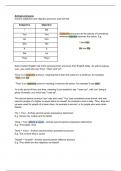Summary
Summary Archaic / Early Modern English terms and definitions
- Module
- Unit 3 - Language over Time
- Institution
- WJEC
Definitions and keywords for Unit 3: Language over time for English Language. This includes archaic words as well as sentence structures and inconsistencies. It is helpful for the first 20 marks on the Lnagauge over time exam.
[Show more]



